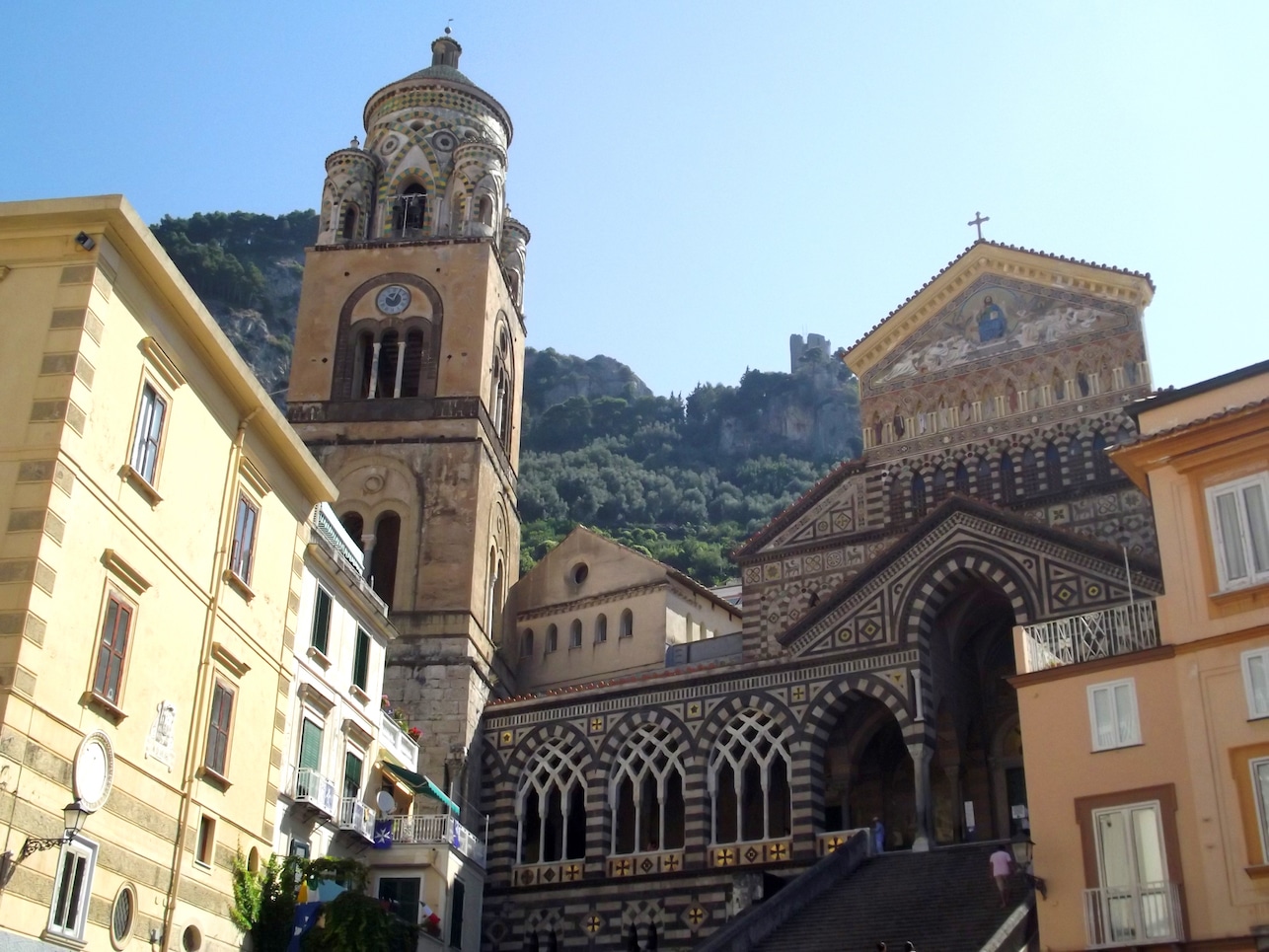At 5am, my alarm hauls me into another day in the Eternal City. An icon on my bedroom wall of Christ Pantocrator comes into focus. It’s a beautiful piece of Christian art that I’ve managed “to vulch” from a former seminarian (“to vulch” is to lay claim to an item from the vulture box of an exiting confrere). The powerful image reminds me what I am doing in Rome. I am a seminarian at the Pontifical Scots College.
A three-day expedition has been organised from St Matthew’s Cathedral in Salerno to the Cathedral of St. Andrew in Amalfi. The fast train from Roma Termini will depart in the evening. Beforehand, I have a full day at the Pontifical University where I must attend classes on the Holy Trinity, Patrology, History of Theology, followed by a Schola Cantorum rehearsal (choir for sacred music), and finishing off after lunch with a mid-term Koine Greek exam.
A cold shower before fastening the Roman collar. As a candidate for the priesthood, I follow the wish of the Diocese of Rome that all her conforming seminarians don the mufti of clerical attire. The green button on my Bialetti coffee machine (another vulch) signals that it’s time to pour. I make my way to the chapel of the Scots College for 30 minutes of silent prayer before Lauds and Mass. This half-hour is sacrosanct; it might be the only time today when I don’t need to be somewhere else. As the morning sunlight passes through Giovanni Hajnal’s stained glass depiction of St Andrew from the Gospel, it refracts into a kaleidoscopic display on the wall. From outside the chapel, a chorus of starlings provides a gentle morning aubade as the congregation of priests, nuns and seminarians grows.
Wearing clerical attire often brings with it interesting scenes: affirming smiles and nods from priests, members of religious orders and passers-by; unexpected discounts from restaurant bills; pleas for spare change. Every day brings something new. I was recently in the supermarket and a burly shop-floor worker, brandishing a silver cross chain, approached me with great excitement, saying, “Padre! Padre! La Chiesa vive! (the Church lives).”
As you enter the Pontifical Gregorian University, you find yourself in a multicultural milieu of 124 nationalities represented in a student body of 2,844, some of whom carry aspirations to become the next bee-knock (“big name on campus”). I make my way up to the top floor with my rucksack and tent and throw them into the locker before the bell. You don’t want to be late for class at the Greg. Punctuality is policed by some professori with great rigour.
Immediately following my Greek mid-term, I whizz to Termini on the Metro. Soon the fast train is darting down the western Italian coast, past Pompeii, arriving at the gulf of Salerno. I’m accompanied by two fellow pilgrims from Scotland. We’re armed with a malt and a Saltire ready to unfurl at the footsteps of St Andrew’s Cathedral in Amalfi. We arrive in Salerno as the dusk turns the sky purple. The Cathedral of St Matthew’s is closed so we bus it to Corpo di Cava and pitch up our tent for the night.
Our pilgrimage to St Andrew’s in Amalfi is part of what makes being a Roman seminarian feel like a cast member in an unfolding epic. It’s a pity more men aren’t attracted to the calling. The crisis of vocations in the Western world is a subject close to my heart. Almost a year has passed since five of my friends discerned out (decided to leave seminary). In a spiritual family it’s always difficult when someone leaves, especially a chum. Generally speaking, there are no easy answers as to why seminarians leave, or indeed why the adventure is never taken up.
In Budapest, the Holy Father was right to remind seminarians to remain steadfast in prayer, not to be drawn into gossip culture and to be courageous enough “to bite your tongue… always remember that our first pastoral priority is to bear witness to communion, for God is communion”.
Seminaries can be all too often saturated with gossip and ideological conflict which undermines the possibility of communion. This can result in seminarians feeling isolated, overwhelmed and discouraged. There is an important correlation between celibacy and communion that deserves mention. That is, the gift of celibacy offered to seminarians can only be realised when the strength of the bonds that exist within their communities are such that they effectively compensate for the lack of intimacy that would otherwise be experienced in an extra-seminary context. In other words, if communion is dissolved, so too will celibacy.
Fortunately, in seminary and in the wider Roman community here, there are so many opportunities for that necessary communion. Whether from confreres, spiritual directors, tutors, friends outside the college or through participation in activities like sport or music, the city of Rome has it all in abundance. The other day, I was on my way to an important music rehearsal with the Ad Hoc Schola Cantorum, an eight-piece SATB sacred music choir I sing bass for. We’re busy preparing for a friend’s ordination at Santa Maria sopra Minerva. The practice took place in the main cloister of the Angelicum University. As I was warming up with the others, something important dawned on me: the membership is made up of singers from Britain, the US, Europe and Asia. I was graciously reminded of the wider reality that I am a part of – the Catholic Church, no less. Deo gratias!



